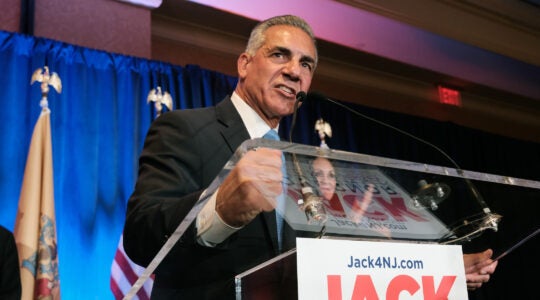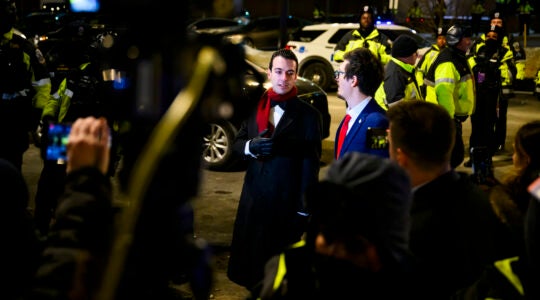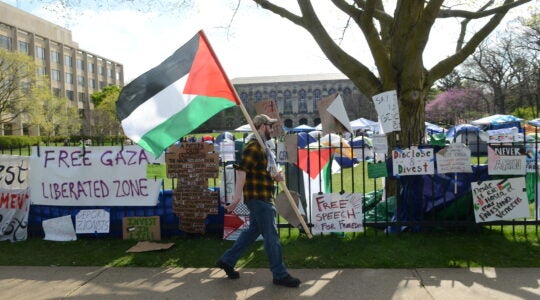(JTA) – A number of Jewish organizations have condemned an upcoming conference on Palestinian culture, taking place at the University of Pennsylvania, that includes speakers accused of antisemitism. But the groups decrying the conference disagree about what the school should do about it.
The biggest name speaking at the “Palestine Writes” festival taking place next weekend, from Friday, Sept. 22 to the afternoon of Sunday, Sept. 24, is that of Roger Waters, the former Pink Floyd frontman who uses Holocaust imagery to bash Israel during his concerts. Other speakers at the conference, the Jewish organizations say, have used language that condones or encourages Israel’s destruction.
Jewish organizational responses have ranged from a call on the university to condemn the conference — which it did last week, albeit in terms that critics called inadequate — to a demand that the university shut the conference down or face legal consequences.
The disparate response point to a divide within the pro-Israel ecosystem over how universities should handle anti-Israel and arguably antisemitic speech on campus. While both sides of the discussion abhor such statements, one cohort of activists believes that federal law requires the university to quash the offensive speech, while the other says the dictates of academic freedom demand that even repugnant speech be allowed, though they say it should be condemned.
Miriam Elman, executive director of the Academic Engagement Network, which works to counter antisemitic and anti-Israel activity on campus, told the Jewish Telegraphic Agency that her group would not demand the conference be canceled “unless there is a case of imminent threat, or bodily harm.” She added, “Our system of academic freedom and campus free expression is that: Offensive speech? Meet it with better speech.”
That approach contrasts with the demand issued by the Zionist Organization of America, which has urged its activists to tell the university to cancel the conference. If the university fails to do so, a recent ZOA action alert said, the right-wing pro-Israel group “may have a moral obligation to file a complaint under Title VI if this conference takes place.” Title VI refers to a section of the Civil Rights Act that bars discrimination in any institution that receives federal funds. Although the University of Pennsylvania is a private university, it receives federal research grants.
Palestine Writes has organized the annual festival since 2020, saying on its website that its founding was “born from the pervasive exclusion from or tokenization of Palestinian voices in mainstream literary institutions.”
Susan Abulhawa, the executive director of “Palestine Writes,” said in an email that most of the festival was about Palestinians, and not Israel, but that naturally there would be expressions of criticism of the country.
“We have a glorious and rich heritage that is either being erased or appropriated by a 20th-century colonial enterprise that has worked overtime to denigrate us where they cannot fully erase us,” she told the Jewish Telegraphic Agency. “It’s disappointing, though unsurprising, that the university could not muster the courage to defend an indigenous people’s moral and necessary struggle against Israeli colonial fascism.”
A festival spokesperson clarified that the event ends several hours before the beginning of the Jewish High Holiday of Yom Kippur, which starts on the evening of Sept. 24. The conference ends at 1 p.m.
Josh Gottheimer, a Jewish New Jersey Democratic congressman and Penn graduate, said in a letter to the university leadership that the university should at least disinvite Waters as well as Marc Lamont Hill, a Temple University professor and commentator fired from CNN in 2018 for calling for a free Palestine ”from the river to the sea” — a phrase many interpret as calling for the elimination of Israel. Hill said at the time that he was unaware of the phrase’s origins and that he was calling for a single binational Israeli-Palestinian state.
Abraham Foxman, the ADL’s former national director, told JTA that the event should trigger an inquiry by the Biden administration as part of its new plan to combat antisemitism. He also said Jewish alumni should organize to stop donating to the university. “The time has come for alumni to be more active,” he said, not just at Penn but on other campuses that have accommodated vehement critics of Israel.
After complaints from Jewish groups, the university made a statement acknowledging that the conference includes “several speakers who have a documented and troubling history of engaging in antisemitism by speaking and acting in ways that denigrate Jewish people. We unequivocally — and emphatically — condemn antisemitism as antithetical to our institutional values.”
Elman’s group and the Anti-Defamation League each told JTA that they hoped the university’s condemnation would be more robust.
For Jewish and pro-Israel groups criticizing the conference, the most objectionable speaker is Waters, who is scheduled to speak on a Friday evening panel about the costs incurred by those who speak out on behalf of Palestinians. Rogers has used Holocaust imagery to criticize Israel, a practice watchdogs have called antisemitic because it trivializes the Holocaust and implies that Jews are now perpetrating its horrors on another people.
A number of other speakers have also been singled out by pro-Israel groups for their praise for members of designated terrorist groups or because they have used incendiary language to implicate all Israelis, not just their government’s policies.
The university’s statement, which was signed by Penn President Elizabeth Magill and two other senior officials, noted that the festival is not organized by the university, although a number of university-affiliated entities — such as the Wolf Humanities Center — are cosponsors.
“As a university, we also fiercely support the free exchange of ideas as central to our educational mission,” the statement said. “This includes the expression of views that are controversial and even those that are incompatible with our institutional values.”
Some critics said that Penn’s leadership had a duty to condemn university-affiliated cosponsors of the conference.
“Universities can definitely express disappointment, chagrin, dismay in faculty choices,” Elman said. “They can say ‘this is terrible judgment.’”
Jonathan Greenblatt, the CEO of the Anti-Defamation League, said in an email to JTA, “Supporting academic freedom and the free exchange of ideas on campus, which ADL joins Penn in supporting, does not abdicate Penn leadership from taking a position.”
The ADL, along with the Jewish Federation of Greater Philadelphia, led a weeks-long effort to get the university to make a statement. The ADL recently released an analysis showing a sharp uptick in what it called “anti-Israel events” on college campuses.
“If Penn truly wants to show real support for the Jewish community, it must stop equivocating and start speaking out and taking action to stand with the Jewish community in an unequivocal, unambiguous manner,” Greenblatt said.
The Jewish federation appreciated the statement but said more needed to be done. “We appreciate the University of Pennsylvania’s recognition last week of the festival’s problematic nature and its misalignment with university values, but we encourage them to put more protocols in place to address antisemitism on its campus,” Jason Holtzman, the Jewish Federation of Greater Philadelphia’s Jewish Community Relations Council director, said in a statement.
Elman and ZOA both noted a difference in the treatment the university has accorded the festival and a Jewish law professor, Amy Wax, who has made incendiary comments about Black and Asian students on the campus. Wax is embroiled in disciplinary hearings, which has spurred criticism of Penn by free speech advocates.
The university’s caution with “Palestine Speaks” may stem in part from a reluctance to wade into another battle over academic freedom. The controversy comes as Wax has invited a white supremacist, Jared Taylor, to campus for a second time. His presence at a 2021 event at Penn stirred protests. The Philadelphia Inquirer quoted students who believe Wax invited Taylor in order to portray the university as an institution that represses free expression.
Michal Cotler-Wunsch, who this week was named as Israel’s envoy to combat antisemitism, told JTA that the university’s commitment to diversity, equity and inclusion demanded a tougher response.
“Held in a DEI campus reality proclaiming commitment to provide and ensure equal access, safety and security to all students and faculty members, [the conference] must be measured with the same yardstick as any other group, recognizing that double standards in the application of any principle or rule undermines it,” she said.
JTA has documented Jewish history in real-time for over a century. Keep our journalism strong by joining us in supporting independent, award-winning reporting.






